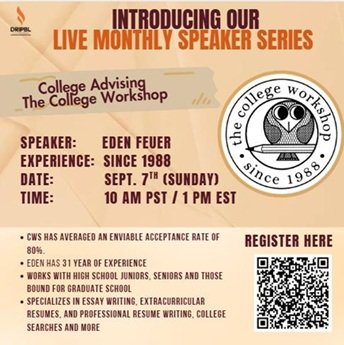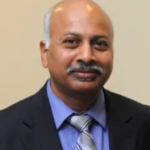By Sarah Abboud
On September 7, 2025, students, parents, and teachers from across the country and even from Kuwait joined a special webinar with Eden, the director of The College Workshop. Eden has helped students apply to college for over 30 years. Her advice was honest, helpful, and easy to understand, especially for students who are just starting to think about college.
Watch the recording here:
Meet Eden and The College Workshop
Eden started helping students with college applications after she had trouble getting help from her own high school counselor. Her mom stepped in to help, and that experience led Eden to start The College Workshop. Today, it’s a well-known program in Arizona with an 80% acceptance rate for students who use it.
What Students Learned
How to Build a College List
Eden explained how to create a list of colleges that includes:
- Reach schools (hard to get into)
- Match schools (you have a good chance)
- Safety schools (you’re very likely to get in)
Eden emphasized the importance of creating a well-rounded list of reach, match, and safety schools. She warned against applying only to “big, ugly long shots” like Stanford or Harvard, and instead encouraged students to assess their academic profile honestly. Tools like Naviance scattergrams can help, but nothing beats personalized guidance. Instead, students should look at their grades, test scores, communtiy, and other strengths to find schools that are a good fit.
Grades and Tests Are Just One Part
While academic performance is crucial, Eden reminded attendees that these are just the “numbers” colleges use to determine if you can handle the coursework. What sets students apart are their extracurriculars, essays, and personal stories.
Colleges also want to know:
- What you do outside of school
- What kind of person you are
- What you care about
Be “Angular,” Not Just “Well-Rounded”
Forget being “well-rounded.” Eden introduced a new idea: being angular. This means focusing deeply on a few things you care about, instead of doing a little bit of everything. Colleges want to see students who show leadership, creativity, and commitment in areas they truly enjoy.
Writing Strong Applications
Eden gave tips for writing college applications:
- Use action verbs and specifics in your activity descriptions.
- Don’t waste space on “lessons learned” in your resume—save that for essays.
- Highlight in-progress projects if they’re meaningful.
- Organize activities by personal importance, not perceived prestige.
When to Start Preparing
Eden recommends starting serious college prep in the second half of junior year. That’s when students should begin working on their resumes and thinking about essay topics. She also suggests taking the SAT or ACT in the spring of junior year, with time to retake it once or twice if needed.
Mental Health Is Important
Both Eden and the educators present, including Rachna Nath and myself, stressed the importance of balance. Overloading on APs or extracurriculars can lead to burnout, which not only affects college applications but also long-term well-being. “You are not going to college right now,” Eden reminded students. “Have a life. Do some interesting things.”
Final Words of Wisdom
Eden ended the webinar with this message: “Life is a process, not just a goal.” Students should follow what they love, ask for help when needed, and not be afraid to make mistakes. Rachna Nath, our DRIPBL CEO, added, “Most of my life is made up of failures—and that’s how I learned and grew.”

M365 Copilot was used to write this blog from the webinar transcripts.



